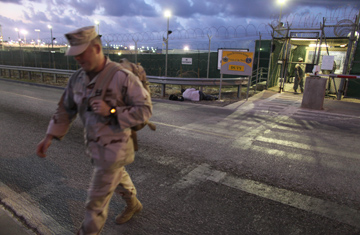
In this May 13, 2009, file photo, reviewed by the U.S. military, a U.S. trooper walks near an entrance to the Guantanamo detention facility at dawn, at Guantanamo Bay U.S. Naval Base, Cuba.
After years of wrangling, the German government has caved to U.S. pressure and agreed to accept two detainees from the Guantánamo Bay detention facility. Germany's Interior Minister Thomas de Maiziere told a news conference in Berlin on Wednesday that the two men — a Palestinian and Syrian, both of whom had spent almost nine years in Guantánamo — would be settled in the north German city of Hamburg, once home to the cell of 9/11 hijackers, and in the west German state of Rhineland-Palatinate. "It's a humanitarian matter," said de Maiziere. "We have a responsibility to help." But the decision has sparked controversy in Germany, with one side claiming officials are risking the nation's safety to score points with the U.S. and the other saying the move is too little, too late.
During his announcement on July 7, de Maiziere didn't offer any details about the former detainees' backgrounds, saying the men deserve a "new life". But according to reports in the German daily Bild, one is Ayman al-Shurafa, a 34-year-old Palestinian and former Hamas activist, and the other is Mahmud Salim al-Ali, a 35-year-old Syrian.
The idea of moving Guantánamo detainees to Germany has provoked skepticism and hostility in the past. In 2006, the Bush Administration asked Chancellor Angela Merkel's government to accept a group of Uighur detainees from Guantánamo. German politicians were divided — some said Germany had a moral responsibility to take them in, others slammed the plan as naive and dangerous — and the issue was put on the back burner.
Then, last year, President Barack Obama raised the topic again with Merkel, but Germany and the U.S. failed to reach agreement, which strained transatlantic relations. Since then, Gitmo has turned into an intractable problem and the Obama Administration has struggled to persuade other countries to take in prisoners. While Merkel repeatedly condemned the U.S. detention facility in Cuba and publicly called for its closure, her government remained hesitant to accept former Guantánamo inmates. German state governors repeatedly blocked any resettlement citing security concerns, arguing that if the prisoners were harmless then why didn't the U.S. take them in?
The news that Germany is now ready to house two detainees triggered an angry response from some politicians and police unions. Some express fears that Hamburg may once again become host to al-Qaeda activity. "We have to help our American friends," Uwe Kossel, head of Hamburg's regional police union. "[But] there is a risk that by housing a Guantánamo inmate in Hamburg, the city could [unwittingly] become a focus for al-Qaeda and possibly a target for attack."
Many observers, on the other hand, say Merkel's government should have accepted more than just two detainees, given that over 180 people are still being held at the facility. "Germany dragged its feet over Guantánamo — this is a long overdue gesture to President Obama," says Henning Riecke, an expert on transatlantic relations at the German Council on Foreign Relations. "It would have been a clear sign of solidarity with the U.S., and with the Obama Administration, if the German government had been quicker and more open to solving the Guantánamo issue a long time ago."
The government says the decision took so long because security agencies had to vet and screen the detainees before giving the green light for resettlement. In March, a delegation of Interior Ministry officials, refugee experts and security officers visited the men at Guantánamo and carried out extensive interviews. "These two inmates are not dangerous and they will live in Germany as free men and we need to find ways to help them integrate into society," says Interior Ministry spokesman, Stefan Paris. Paris adds that the German government "assumed that medical and psychological counseling will also be necessary" when the men are transferred in the next few months. But he denied claims by Germany's police trade union that the men would need 24-hour protection.
U.S. government officials have welcomed Germany's move. "We greatly appreciate Germany's decision to resettle these two detainees," said U.S. State Department spokesman Mark Toner on Wednesday. U.S. observers in Berlin point to the agreement as testament to the strength of the ties between the two nations. "Germany has made an important and unexpected symbolic gesture to the Obama Administration," Gary Smith, executive director of the American Academy in Berlin, tells TIME. "This demonstrates that behind the scenes, the German and U.S. governments are engaged in intense dialogue on a wide range of issues."
However, it's clear that Berlin's generosity and "responsibility to help" has its limits. Interior Ministry spokesman Paris was quick to point out that Germany would not be opening its doors to any more Guantánamo detainees in the future. As Germany sees it, shutting down the facility and finding homes for the inmates is a problem the U.S. needs to solve on its own.
